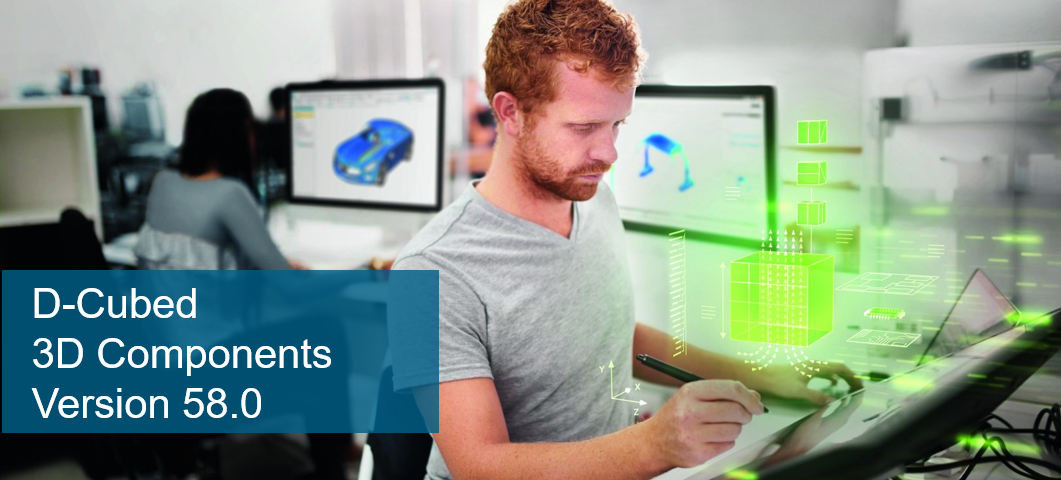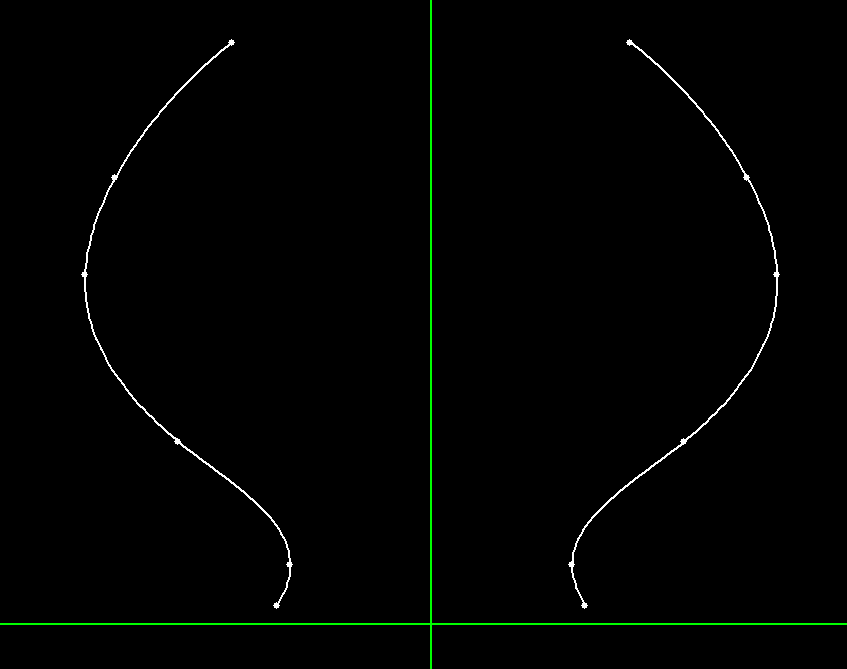D-Cubed 3D Components release highlights

D-Cubed 3D components are integrated by software developers to add 3D modeling capabilities to CAD/CAM/CAE and AEC software applications. These applications are used to design, analyze, visualize, and manufacture products from consumer goods to aircraft engines and commercial buildings.
D-Cubed 3D DCM version 58.0
D-Cubed 3D DCM (3D Dimensional Constraint Manager) is a geometric constraint solving software component. Supporting a wide range of geometries, dimensions and constraints, 3D DCM enables 3D parametric sketching, part shape control using direct modelling, assembly part positioning and kinematic motion simulation. Key enhancements introduced in version 58.0 of D-Cubed 3D DCM are described below.
Symmetric spline improvements
Support has been added for symmetry constraints between compatible splines, improving reliability:

The functionality is now more like that in 2D DCM.
Information coincident constraint
The information coincident constraint now supports sweep surfaces.
Improved solving for models with large size
Solving enhancements have been added to improve computational accuracy when working with model data far from the origin. Especially large models can be challenging to handle despite 3D DCM’s highly accurate solving resolutions.
D-Cubed CDM version 58.0
D-Cubed CDM (Collision Detection Manager) is a software component that offers collision detection and clearance distance measurement for solid, surface, wireframe and point cloud models. It supports accurate, tolerant and faceted geometry. Used in assembly, mechanism, machining and measurement simulation environments, CDM offers a range of algorithms to interactively detect collisions and compute clearances, even on large, complex assemblies. Performance is particularly excellent for common operations, such as repeated computations on models that are in motion. CDM is compatible with most applications, being independent of any modeler or model format. Key enhancements introduced in version 58.0 of D-Cubed CDM are described below.
Closest approach between groups – consistent solution on mixed containment
A set is a CDM entity that holds a collection of geometries, with one set typically, but not necessarily, representing one model part. A group is a CDM entity that holds a collection of sets. Support for closest approach computations between groups was introduced in the previous release of CDM.
The closest approach solution for groups is now more consistent and better defined in cases where the containment status of a group with respect to another group is inconsistent between members.
Point-in-face performance improvements
Improvements have been made to the critical point-in-face algorithms, especially where multi-threaded, multi-point closest approach computations are involved.
Parasolid® wrapper
A wrapper interface assists with the integration between CDM and the Parasolid modeller. The wrapper now supports Version 33 of Parasolid.
D-Cubed HLM version 58.0
D-Cubed HLM (Hidden Line Manager)) is a software component that provides applications with a fast hidden line computation capability. HLM is optimized for solid, surface and wireframe models, with support for accurate, tolerant and faceted geometry. HLM is compatible with most applications, being independent of modeler or model format. HLM accurately computes hidden line views, engineering drawings and technical illustrations of parts and assemblies with exceptional performance, reliability and functionality. Key enhancements introduced in version 58.0 of D-Cubed HLM are described below.
Silhouette curve reliability improvements
Silhouette curves occur on curved surfaces where the surface normal is perpendicular to the view direction. Complex silhouette convexity and containment.situations are now better handled, improving hidden line views.
Improved stability in computation of interpenetration edges
Edges can interpenetrate parts and the HLM will correctly compute the edge visibility in such situations. Improvements to the stability of such computations have been released in Version 58.
Parasolid® wrapper
A wrapper interface assists with the integration between HLM and the Parasolid modeller. The wrapper now supports Version 33 of Parasolid.
D-Cubed AEM version 58.0
D-Cubed AEM (Assembly Engineering Manager) is a software component that enables applications to simulate the motion of assemblies and mechanisms. It accounts for the mass properties of parts, the motion caused by a range of engineering forces and devices and the interaction of parts as they collide and transmit motion to each other. Key enhancements introduced in version 58.0 of D-Cubed AEM are described below.
Enhancements to contact computations
AEM has pioneered motion simulations in environments where accurate solid models, not faceted approximations, come into contact and push each other around. This is a more sophisticated process than operating on faceted parts, as there are many more geometry types and configurations involved in computing contact-based motion on full solid parts. The benefits are substantial, including the direct simulation of motion on parts with a geometric accuracy that is suitable for engineering applications, rather than visualization or entertainment. The latest release sees ongoing improvements to the algorithms used to calculate the contacts when bodies collide.